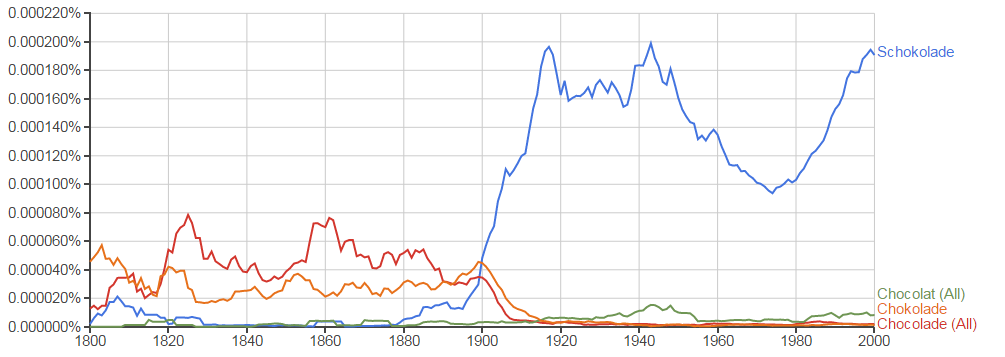My pantry currently contains a Lindt bar that says Edelbitter Chocolade on the wrapping. I wonder if this is spelling of Schokolade is just a fancy of that particular manufacturer, or a quite usual spelling, or somehow significant.
-
3No, it's not Dutch. lindt.de/produkte/weihnachten/tafeln/… The whole packaging has German on it. It's only the word "Chocolade" with is odd.– JankaCommented Nov 21, 2016 at 22:06
-
3Lindt & Spruengli is a Swiss company. if you check their website you'll see they spell it several ways, but they make it in the Chocoladefabrik in Kilchberg. The etymology says it comes from the Spanish chocolate and the French chocolat. The Swiss have their own version of the German language.– RedSonjaCommented Nov 22, 2016 at 12:18
-
@RedSonja I was thinking of something like that. At least Lindt seems to be consistent in this. If you can retrieve it from their website, I'd be grateful if you could post it as an answer. I cannot find it, possibly because the website presents itself alternately in Czech and in English, but not in German.– anemoneCommented Nov 22, 2016 at 12:42
-
1I hereby preemptively disagree with the two close votes that claim this question could be answered by looking at a dictionary or grammar book. Typically, explanations about why a certain variant of an expression is chosen over another one are at best vaguely alluded to by (non-)informative keywords in dictionaries that can never replace the interpretation (also with respect to the individual occurrence) by someone knowledgeable about the language.– O. R. MapperCommented Nov 22, 2016 at 22:22
4 Answers
Here is a ngram for Schokolade/Chocolade and Chocolat:

You can see Chocolade (and Chokolade) is an old writing, it was the common writing before 1900. As a trade name you can give the impression of a traditional piece of chocolate.
You can also use the French version Chocolat which gives also an impression of quality. In a Chocolaterie you get hand made chocolate, the French word is also a reminiscence of Switzerland (Romandy)
To answer your question:
I wonder if this is spelling of Schokolade is just a fancy of that particular manufacturer, or a quite usual spelling, or somehow significant.
It is no usual spelling. Only Schokolade is correct. But it is a common writing of chocolate producer to give there article a special image.
-
1I see. That's an interesting point about the original spelling, I did not know that. So it has a tinge of both tradition and of the exotic.– anemoneCommented Nov 21, 2016 at 22:52
-
2I found an additional old writing: Chokolade. This writing disappeared. It seems the k isn't exotic enough :) Chokolade looks like a wrong combination of the traditional (nearly french) chocolad and the new writing Schokolade.– knutCommented Nov 21, 2016 at 22:58
-
I did not know that Chocolade was the common writing before 1900 and would presume that very few Germans are aware of this. So I doubt that it gives the "impression of a traditional piece of chocolate." To me it sounds more like the "touch of French" thing, making it look more fancy. Also misspelling a word like this, could make it stand out (e.g. in a shop full of "Schokolade"-labeled chocolates). Commented Nov 22, 2016 at 10:09
C is for exotic.
Lindt isn't the only company doing this. The bare C is seldomly used in German, so it looks exotic and precious. At least that's what the marketing guys think:
Meine Damen, meine Herren, unser neuer Duft: Cul de sac.
-
You mean 'exotic' in the sense of 'a touch of France', or something along that line?– anemoneCommented Nov 21, 2016 at 22:11
-
5
-
6
-
1Die meisten Karsten die ich kenne schreiben sich mit K. Vielleicht schlummert ja ein feuriger Südländer in dir.– JankaCommented Nov 21, 2016 at 22:25
-
3In my experience, the impression the marketing guys want to convey might be described better as "refined" than "exotic". In a similar way something "exklusiv" is spelled "exclusiv". Commented Nov 22, 2016 at 0:51
The spelling "Chocolat" is the spelling used in French language so the spelling "Chocolade" is similar to the French one.
In Germany many companies who try to give their products (mainly food and cosmetics) the reputation of having a higher quality use French words instead of German words or they use a spelling which is similar to French.
Another very common example for using French words would be pastry cooks who whose the word "Confiserie" instead of the German word "Konditorei" for their pastry shop.
Lindt is one of the companies often advertizing their products as "higher-quality" products. (I remember an advertising spot in TV where they claimed that they need more time for the production than the competitors because this is needed for a special taste of the chocolate.)
"Chocolade" is a French word with a German ending (ade). The original French is "Chocolat."
A purely German spelling (preserving the sound), is "Schokolade." That is, the "ch" would be accompanied by an s, and the second c would be replaced by a k.
But the user of the term "Chocolade" wanted to combine both the French and German elements, preserving the original French "c"'s, while using the -ade ending to signify that the word had been Germanized to some degree. This was probably done for "chicness." (Note the French "ch" and "c" in the last word.)
